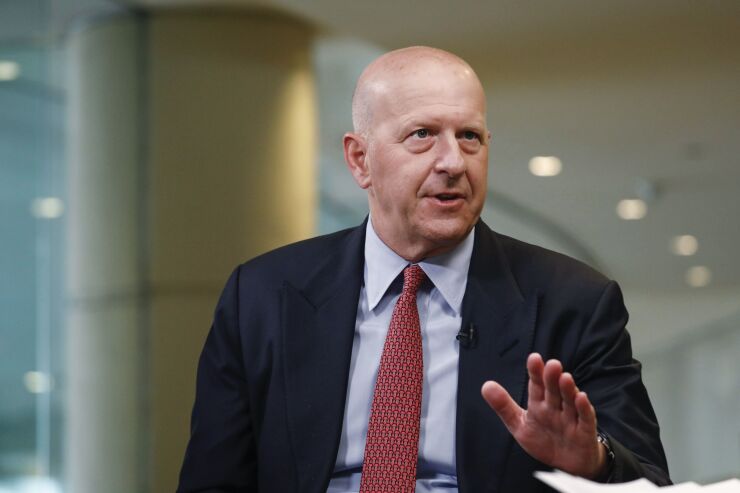
After Goldman Sachs took several recent steps to scale back its ambitions in Main Street banking, company executives raised the possibility Tuesday that key parts of its consumer lending unit could be sold or restructured.
At the same time, Goldman executives who spoke at the company's investor day described a path to profitability for the consumer lending businesses, which have so far underperformed expectations.
The dueling strategies — growth or a major shake-up — reflect the difficulties the Wall Street behemoth continues to face years into its effort to become more of a full-service bank. Analysts pressed CEO David Solomon for additional details on which path Goldman will pursue, and how quickly, but they were rebuffed.
"We are focused on executing on what's in front of us, and we're looking at all strategic options available to us," Solomon said. "I know that you want more clarity, but I would ask you to appreciate that I'm just not in a position to say anything more than what we said."
There is no "straightforward, simple answer" on what those "strategic alternatives" are, Solomon said. While they may involve moving on from parts that don't "fit strategically" within Goldman Sachs, there are also "lots of different ways" to improve operations from within, Solomon said.
Goldman has credit card partnerships in place with Apple and General Motors. It also reaches consumers through its GreenSky point-of-sale platform, where it makes loans to homeowners through a network of thousands of home improvement contractors. Goldman bought GreenSky last year.
It's unclear which parts of Goldman's consumer business could be sold, but major credit card companies and consumer lenders "would be the obvious potential buyers," Mark Narron, senior director at Fitch Ratings, said in emailed comments.
"Goldman is realizing that it lacks the potential to reach scale in some parts of its consumer strategy and therefore the clock either has or could run out," Narron said.
While Goldman could opt for a sale of its consumer businesses, it could also bring in a new "majority-controlled partner" to run them and take on some of the risk involved, Kenneth Leon, research director at CFRA, wrote in a research note.
One success story has been Goldman's Marcus consumer savings platform. The online deposits gathered there have boosted the stability of the bank's funding after it experienced troubles during the 2008 financial crisis.
But certain other ambitions in consumer finance, which Solomon had championed since becoming Goldman's CEO in 2018, have recently been scaled back.
Last month, Goldman
Meanwhile, plans to roll out a Marcus checking account to U.S. consumers were initially
Goldman's consumer businesses have been dogged by hefty costs.
The platform solutions division, which includes the bank's credit card partnerships and its GreenSky business, lost roughly $1.7 billion last year. While operating expenses drove some of those losses, the money that Goldman has set aside to cover potential losses on its growing loan book has also eaten into revenues.
Stephanie Cohen, the division's leader, said the company is targeting breaking even in that unit in 2025, without factoring in taxes.
"While nothing is ever a straight line, we are making progress on our path to profitability," Cohen said Tuesday.
Goldman has no plans to expand its list of credit card partners beyond Apple and General Motors. But those two companies have more than 100 million customers, and Goldman only has a relationship with 12 million of them, giving the bank "ample opportunity for future growth" in credit cards, Cohen said.
She also touted opportunities in the GreenSky business, saying that the segment is continuing to see strong loan demand, and that its agreements with home improvement merchants have proved "sticky and valuable" over the years. GreenSky's customers, meanwhile, are high-quality borrowers with average credit scores of 770, Goldman executives said.
In addition to earnings-related difficulties in its consumer businesses, Goldman has been facing scrutiny from federal regulators.
The Wall Street Journal
Some analysts are skeptical that Goldman should continue the consumer initiative. Mike Mayo, an analyst at Wells Fargo Securities, said that Goldman's global banking and markets division is "killing it," but he asked why Solomon doesn't "call it a day" with GreenSky and consumer credit cards.
He likened Goldman's trajectory to the basketball star Michael Jordan's brief and lackluster stint in professional baseball.
"You're like one of the greatest of all time in what you do, your core business," Mayo said. "But these extracurricular activities have really hurt your reputation, hurt your financials, and seems like you took too long to kind of cut some of your losses."

Following Goldman's first investor day since 2020, the company's stock price fell 3.64% to $354.14 in late-afternoon trading.
During his remarks, Solomon acknowledged that Goldman has not "executed well" on parts of its consumer strategy, and he said that executives are "working very aggressively to correct it." But he also noted that consumer banking makes up a "relatively small" part of the bank's broader business.
"I won't for a minute say that it's not meaningful, and we're not focused on it," Solomon said. "But I think it should be kept in perspective."





